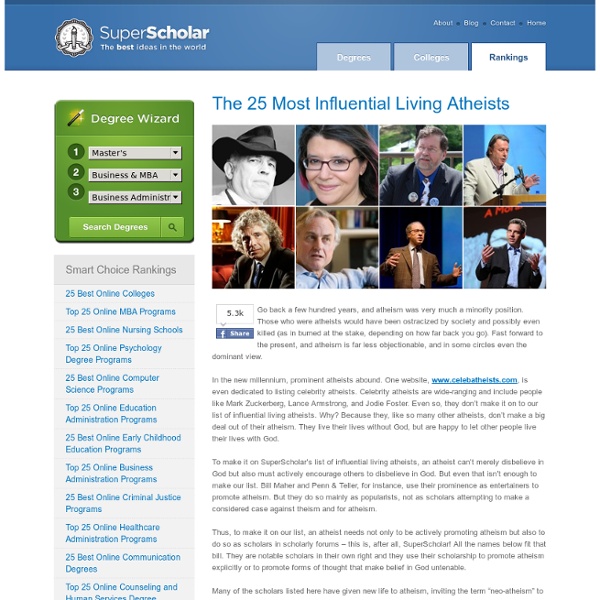The 25 Most Influential Living Atheists

The Filthy Little Atheist … Founding Father
[Site editor's note: The following is an excerpt from the new Disinformation title 50 Things You're Not Supposed To Know: Religion, authored by Daniele Bolelli.] The story of his life is richer and weirder than any fiction. Among his close friends were visionary poets such as William Blake as well as political icons like Benjamin Franklin. During the American Revolution, George Washington used his writings to inspire his troops to remember what they were fighting for, and even suggested that no other individual had done more for the cause of American independence. The man we are speaking of is Thomas Paine. Even though his name is relatively well known, it is not nearly as celebrated as one may imagine given such a wild, intense existence, and such a deep impact on history. Paine’s problem is that he didn’t die in 1792. What exactly was it about The Age of Reason that transformed Paine into a ghost among the founding fathers?
State of the Nation
The first incorrect assumption I would like to address is the topic of "belief": Atheism is a belief system. Atheism is not a belief system because there isn't anything we are "believing" that could be considered a "system." Atheism doesn't join people together in a common ideology like religions do because atheists share nothing in common, except their lack of belief in 1 specific thing. Imagine trying to label other groups based on their lack of belief in 1 specific thing. In a way, people will get into a discussion of semantics of whether atheism is a "belief" or not, but really that is only because it is possible to state the any negative belief as a belief in the negative, which kinda works in english even if it doesn't exactly convey the position. Some definitions of atheism will even say something along the lines of "belief there is no god" but really the issue here, from my perspective, is that there are a number of things I believe. But the things I don't believe are infinite.
PAT CONDELL'S GODLESS COMEDY
The Blog : Morality Without “Free Will”
From the Free Press: A belief in free will touches nearly everything that human beings value. It is difficult to think about law, politics, religion, public policy, intimate relationships, morality—as well as feelings of remorse or personal achievement—without first imagining that every person is the true source of his or her thoughts and actions. And yet the facts tell us that free will is an illusion. In this enlightening book, Sam Harris argues that this truth about the human mind does not undermine morality or diminish the importance of social and political freedom, but it can and should change the way we think about some of the most important questions in life. In this elegant and provocative book, Sam Harris demonstrates—with great intellectual ferocity and panache—that free will is an inherently flawed and incoherent concept, even in subjective terms. Free will is an illusion so convincing that people simply refuse to believe that we don’t have it.
Related:
Related:



